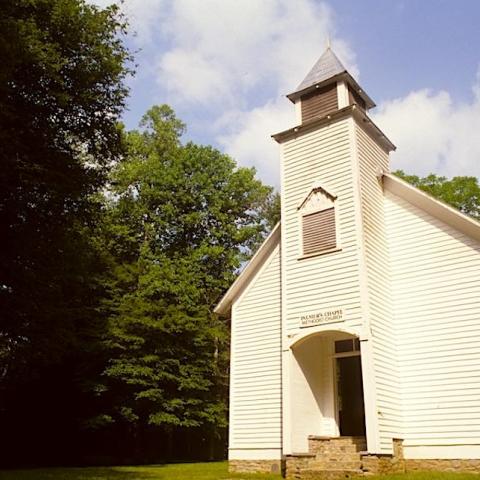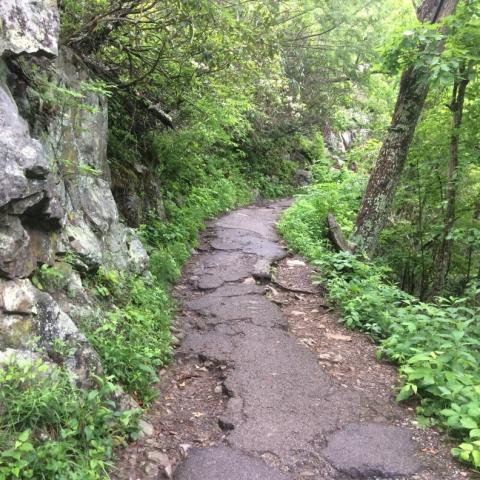Top Interior Department and National Park Service officials used Earth Day to promote the National Park System as an economic engine with an annual output of $30 billion and which serves as a carbon sink with an additional value of nearly $600 million.
The report, released at 6 a.m. Eastern on Wednesday, comes at the mid-point of National Park Week and as the National Park Service builds on its campaign to mark its centennial in August 2016.
Along with touting the economic value of the park system, a clutch of accompanying reports pointed to $26 million in improvements to parks from coast to coast, the president's "Every Kid in a Park" initiative that will see 4th graders this fall receive an annual parks pass, and the "Find Your Park" campaign to connect all Americans to the country's system of public parks and recreation lands.
In 2014, the National Park System received over 292 million recreation visits. NPS visitors spent $15.7 billion in local gateway regions (defined as communities within 60 miles of a park). The contribution of this spending to the national economy was 277 thousand jobs, $10.3 billion in labor income, $17.1 billion in value added, and $29.7 billion in output. The lodging sector saw the highest direct contributions with 48 thousand jobs and $4.8 billion in output directly contributed to local gateway economies nationally. The sector with the next greatest direct contributions was restaurants and bars, with 60 thousand jobs and $3.2 billion in output directly contributed to local gateway economies nationally.
In a prepared statement, Interior Secretary Sally Jewell said the economic data underscore that, 'Our national parks often serve as economic engines for local communities, drawing tourists from around the world who pump money into area stores, restaurants, hotels and more. At the same time, these treasured landscapes have shown they support strong public health by absorbing carbon pollution that contributes to climate change. When we invest in our parks, we're not only preserving our natural and historic sites, we're supporting strong economic growth and healthier communities.'
Gateway communities to the parks were a large benefactor of this spending, as motels and hotels in those communities received $9.5 billion in business from park visitors, while commercial campgrounds in those communities saw $922 million in business, according to the economic report.
The economic news was welcomed by the National Park Hospitality Association, which represents national park concessionaires.
'We applaud NPS efforts to describe the importance of park visits to regional and national economies ' it is significant, indeed," said Derrick Crandall, the association's counselor, in an email. "Even beyond the important figures contained in the report, national parks play an important role in prompting purchases of recreational equipment well beyond the 60-mile region around parks ' including major goods like RVs and boats and clothing. We also note that this report does not assess the value of our parks on inbound tourism to the United States ' a major and growing positive influence on our national economy.
'Best of all, the economic value of national parks to the nation can be enhanced without threats to the natural, cultural and historic resources of park units with management changes like longer operating hours and seasons and investment in appropriate visitor facilities designed to be low impact and efficient to operate.'
The news was also welcomed at the National Parks Conservation Association, where Craig Obey, the group's senior vice president for government, noted that, "It's clear that when our national parks are a priority, our economy benefits. The $3 billion increase in economic impact over 2013 is because more people visited parks, parks and communities didn't suffer the negative impact of a federal government shutdown, and the sequester cuts to parks were temporarily addressed.
'We had a record-breaking number of visits to national parks in 2014, and even more visits are likely with the approaching park centennial. This is the time to permanently end the sequester, reverse annual funding shortfalls, and fix park infrastructure with a pro-park transportation bill," he added in a prepared statement.
The report noted that its figures were best estimates based on various models, and that were likely over-estimated in some areas, and under-estimated in others.
As for parks serving as carbon dioxide sinks, the press release said, "Scientists found that 78 percent of the parks studied functioned as net carbon sinks, meaning that more CO2 is stored, or sequestered, than is released. Great Smoky Mountains National Park stored the largest amount of CO2, 1.6 million metric tons, valued at $64.4 million, each year."
"...in aggregate, NPS lands in the conterminous United States are a net carbon sink, sequestering more than 14.8 million metric tons of carbon dioxide annually. The associated societal value of this service is estimated at approximately $582.5 million per year," the report added.






 Support Essential Coverage of Essential Places
Support Essential Coverage of Essential Places







Comments
I would feel a whole lot better about this "carbon dioxide sink" business if Interior Secretary Jewell, et al., conceded that this applies to ALL open land, including the public lands surrounding the national parks currently targeted for massive, renewable energy projects. So, how about it, Secretary Jewell? Can we do those environmental impact statements properly for a change, or is it just the national parks you intend to credit for reducing carbon?
Forty-five years ago, Earth Day meant the earth. I would like to hear how that "economic engine" is doing, but yes, that may be above everyone's pay grade. That level of preservation would take real discipline. Just don't preach to me about reducing my carbon footprint if you think the problem is resolved with a boundary. Inside the parks--we will save the land. Outside the parks, have at it.
Earth Day. The most important thing about the national parks they can think of for Earth Day is that they're an economic engine. This is so wrong on so many levels I can't even begin to list them all.
But Dr. Runte, doesn't there have to be a starting place? And aren't parks a good one -- hopefully of many?
Shouldn't the U.S. be a leader in this and not be dragged, kicking and screaming, into efforts to become the best Earth stewards we can be?
Even if the only thing important to some is money, our reluctance to look forward and our insistence on looking backward is costing us many opportunities for jobs and businesses.
Again, let me highly recommend the book, The Human Age by Diane Ackerman.
But mega, in America if it's not tied to money, it just doesn't merit any attention at all.
i agree Megaera and Dr. Runte, the secretary should have started with the ecological value of parks and public lands and the importance of thinking about that in our daily lives. Thanks for posting Traveler.
The dollarizing distresses me. I've mentioned before that I feel the National Parks are one of those places where the nation decides the intangibles are self valued. A scenic overlook should inspire a 'wow', rather than looking around for the box to drop a quarter into or quibbling over the price of the turn-out's parking lot. The more such sights that are lost due to unscrupulous development or factory smokestacks, the more priceless value the remaining ones build.
That, to me, is the meaning of Earth Day in the National Parks.
Lee, I am all for "starting" somewhere, so long as the somewhere makes biological sense. Where is it written that I have to give up my public lands to "save" planet earth from disaster? Ms. Ackerman is a stray following the herd on that issue. Many greater minds--greater scientists--have forewarned us about destroying any part of the natural world, whether or not it was "preserved" in parks.
I say again: If the national parks are worth preserving as "carbon sinks," ALL land is worth preserving as carbon sinks. If land (and plants) absorb carbon, it would seem incumbent on us to be protecting the land itself, no matter what it is called.
That is "old-style" environmentalism, I know. Pardon me, then, for being an old-style environmentalist. It was Aldo Leopold who taught me to know the difference between preservation and expedience. In which case, I fear that my government prefers the latter, since it was my government that just drew a distinction between preserving the earth and preserving parks. I do not draw that distinction--and never have. I have forever believed that we need a "land ethic" as much as we need the national parks.
But thier dishonest ideological, not science or ecological, driven rules and policies are continuing to reverse and slow down that engine in many cases.